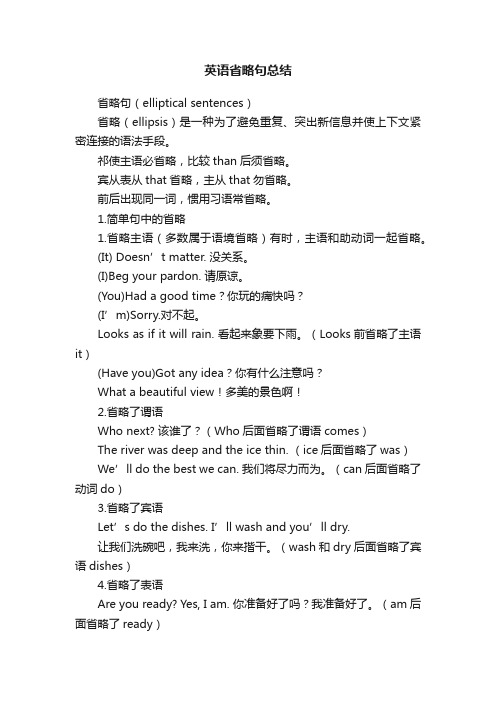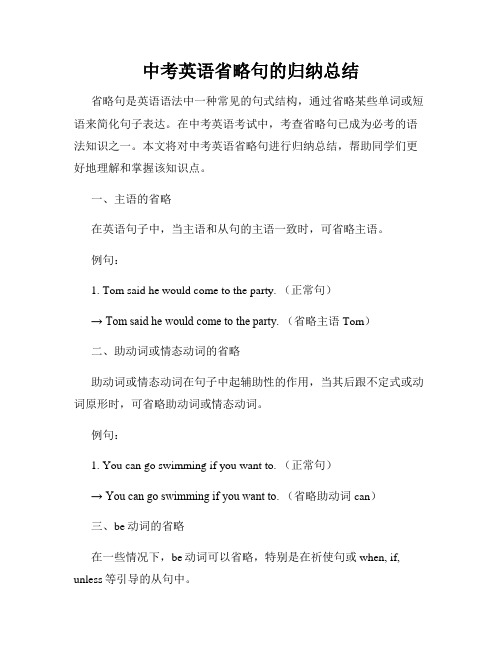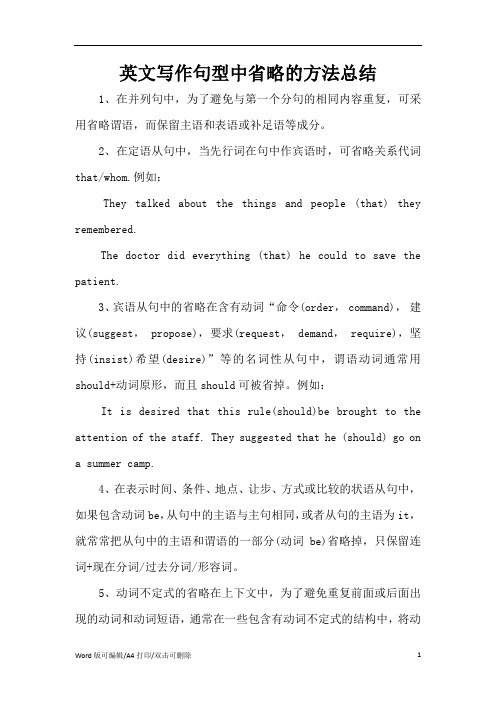英语句型中的省略
英语中的省略

英语中的省略为了避免重复,英语句子中某些部分可以省略。
常见的省略有以下几种:一、状语从句中的省略在时间、条件、让步及比较状语从句中,如主句和从句主语一致(或从句主语是it),且从句含be动词时,可将从句中的主语和be动词省略,从而构成“连词+ 分词/形容词/副词/介词”结构。
这里常见的连词有when/while/as/if/unless/once/although/though/than等。
When (water is )heated, water is turned into vapor. 水加热时变成气体。
He works very hard though(he is)rather weak. 他尽管体弱,但他十分努力地工作。
He came earlier than(he had been)expected. 他来得比预料的要早。
考例:①The research is so designed that once ____ nothing can be done to change it.A. beginsB. having begunC. beginningD. begun②If you go to Xi' an, you will find the palaces there more magnificent than commonly ___ .A. supposingB. supposedC. to supposeD. suppose分析:①D。
once后省略了the research is begun ②B。
比较状语从句中的完整形式是:than they are commonly supposed。
二、并列结构的省略1.并列结构一般由and, or, but等连接,他们可以连接单词、短语或分句,其中相同成分出现时可以被省略。
One of the sides of the board should be painted yellow, and ____.A.the other is whiteB. another whiteC. the other whiteD. another is white选C。
英语省略句的用法

省略句的基本情况总结省略句的基本情况分为以下三个方面:1。
为避免重复而进行的省略。
当一个句子中有两个或更多相同的词、短语出现时,其中的第一个须保留,其余的往往省略,以达到避免重复、使句子简练的目的。
高考中尤其要注意的情况是:当时间状语从句、地点状语从句、方式状语从句、让步状语从句、条件状语从句等状语从句中的主语与主句的主语一致并含有be时,往往将该状语从句中的主语和be一同省略。
例如:He hurt himself while (he was)playing basketball。
他在打篮球时受了伤。
// He works very hard though (he is)still rather weak。
他虽然身体还很虚弱,但他非常努力地工作。
2.语法上的省略.有些成分的省略是出于语法上的原因—-使表述更为简明,例如: He got up at six (o'clock).他六点钟起床.// He is twelve (years old)。
他十二岁.// I walked (for) ten miles。
我走了十英里路.3.习惯用法上的省略。
有些省略句的情况是出于习惯用法,尤其是在口语中.例如,在问句中be常常省略,有时连主语一起省略: Very easy?很简单吗?// Feeling unwell?感觉不舒服吗?又如以what,how或why开头的某些问句:What (happened) next?下面要发生什么?// Why not?为什么不?// Why so?为什么这样?[考题1]He has made a lot of films,but ____ good ones。
A。
any B。
some C。
few D。
many[答案]C[解析]下划线处之前的but决定了只能选择具有否定含义的选项C。
题干中的“few good ones”为省略句形式,单独看起来不好理解,应联系上文理解为“He has made few good films。
英语中的省略现象

英语中的省略现象在英语中,为了避免重复,句⼦中的某些部分经常省略,给考⽣的理解增加了困难。
在近⼏年的NMET 中,省略现象⼗分常见,为帮助考⽣更好地迎战⾼考,现对省略现象总结如下: ⼀、并列复合句中某些相同成分的省略。
1. This beeper works well,but that one doesn餿 (work well). 这个寻呼机⼯作正常,但那个就不⾏。
2. All uranium atoms do not have the same atomic weight. Some of them weigh 234 units,some (of them) (weigh) 235 units,and some (of them) (weigh) 238 units.ニ有的铀原⼦并⾮都有相同的原⼦量。
其中有的重234,有的重235,⽽有的重238。
⼆、在when,while,if,as if,though(或although),as,until,once,wheth er,unless,where 等连词连接的状语从句中,常省略跟主句相同的主语和be动词。
1. When (water is) pure,water is a colorless liquid. ⽔纯净时,是⽆⾊的液体。
2. When (I am) in trouble I always turn to her for help. 我困难时总是找她帮助。
3. Errors,if any,should be corrected. 如果有什么错误,就应当改正。
(if后省略了there are) 4. Wood gives much smoke while (wood is) burning. ⽊头燃烧时,它放出很多烟。
5. The letter is to be left here until (it is) called for. 这封信留在这⾥待领。
英语省略句总结

英语省略句总结省略句(elliptical sentences)省略(ellipsis)是一种为了避免重复、突出新信息并使上下文紧密连接的语法手段。
祁使主语必省略,比较than后须省略。
宾从表从that省略,主从that勿省略。
前后出现同一词,惯用习语常省略。
1.简单句中的省略1.省略主语(多数属于语境省略)有时,主语和助动词一起省略。
(It) Doesn’t matter. 没关系。
(I)Beg your pardon. 请原谅。
(You)Had a good time?你玩的痛快吗?(I’m)Sorry.对不起。
Looks as if it will rain. 看起来象要下雨。
(Looks前省略了主语it)(Have you)Got any idea?你有什么注意吗?What a beautiful view!多美的景色啊!2.省略了谓语Who next? 该谁了?(Who后面省略了谓语comes)The river was deep and the ice thin. (ice后面省略了was)We’ll do the best we can. 我们将尽力而为。
(can后面省略了动词do)3.省略了宾语Let’s do the dishes. I’ll wash and you’ll dry.让我们洗碗吧,我来洗,你来揩干。
(wash和dry后面省略了宾语dishes)4.省略了表语Are you ready? Yes, I am. 你准备好了吗?我准备好了。
(am后面省略了ready)He was a lover of sports as he had been in his youth.他还是象年轻时那样,是一位运动爱好者。
(had been后面省略了a lover of sports)5.省略了状语He was not hurt. Strange! 他没有受伤,真奇怪!(Strange前面省略了状语how)6.同时省掉句子几个成份。
中考英语省略句的归纳总结

中考英语省略句的归纳总结省略句是英语语法中一种常见的句式结构,通过省略某些单词或短语来简化句子表达。
在中考英语考试中,考查省略句已成为必考的语法知识之一。
本文将对中考英语省略句进行归纳总结,帮助同学们更好地理解和掌握该知识点。
一、主语的省略在英语句子中,当主语和从句的主语一致时,可省略主语。
例句:1. Tom said he would come to the party. (正常句)→ Tom said he would come to the party. (省略主语Tom)二、助动词或情态动词的省略助动词或情态动词在句子中起辅助性的作用,当其后跟不定式或动词原形时,可省略助动词或情态动词。
例句:1. You can go swimming if you want to. (正常句)→ You can go swimming if you want to. (省略助动词can)三、be动词的省略在一些情况下,be动词可以省略,特别是在祈使句或when, if, unless等引导的从句中。
例句:1. Be quiet and listen to the teacher. (正常句)→ Be quiet and listen to the teacher. (省略be动词)四、状语的省略当主句和从句之间的时间状语、地点状语、方式状语等相同或相似时,可将其在从句中省略。
例句:1. He lives in Beijing and I live in Beijing. (正常句)→ He lives in Beijing and I do too. (省略相同的地点状语in Beijing)五、连接词的省略在句子中,连接词如and, but, or等可以省略,特别是在并列句中。
例句:1. She is tall and she is thin. (正常句)→ She is tall and thin. (省略连接词and)六、祈使句中的省略在祈使句(祈使句用于表达命令、请求、劝告等)中,主语you可以省略。
用法归纳之“省略”(最新)

用法归纳之“省略”一个句子中某些部分被省掉了,这种情况在语法中被称作“省略”。
省略在英语学习中,尤其是在交际对话中普遍存在,因为它可以避免重复,突出重点,使语言精练,达到言简意赅的作用。
省略有词法上的省略,也有句法上的省略,一起来看下面的分析:一、词法中的省略1. 冠词的省略(1) 避免重复;例:The lightning flashed and (the) thunder crashed.电闪雷鸣。
(2) 在副词的最高级前面的定冠词常可以省略;例:She perfoms best in the class.她在班上表现最出色。
(3) 在as引导的让步状语从句中,当作表语的单数名词提前时,不定冠词要省略;例:Child as he is, he knows something of electricity.虽然他还是个孩子,却懂得一些电学知识。
(4) 在某些独立主格结构中;例:My mom came back, concert ticket in hand. 即:My mom came back, with a concert ticket in her hand.妈妈回来的时候手里拿着一张音乐会的票。
2. 名词所有格后修饰的名词在以下情况时可以省略(1) 如果名词所有格修饰的名词在上句已出现,则下句中再出现此名词时可以省略;例:This is Jack’s dictionary and that is Sara’s (dictionary).这本是杰克的词典,那本是萨拉的词典。
(2) 名词所有格后修饰的名词如果是指诊所、住宅、商店等地点时,这些名词也常省略;例:at the doctor’s 在诊所at Mr. Wright’s 在怀特先生家3. 介词的省略(1) both后常跟of的介词短语,其后可以接名词复数形式,也可以接代词宾格复数形式。
接复数名词时,介词of可以省略,但接代词宾格时,of不能省略;例:Both the teachers often answer the questions.这两个老师都常常解答问题。
关于英语中省略介词的七种常见情形讲解如下(9月1日)

关于英语中省略介词的七种语言现象探讨如下【一】介词in的省略【1】在in this way, in that way, in the same way, in another way 等表达中的介词in 通常可以省略:Do it (in) this way. 这样做。
Let me put it (in) another way.让我用另一种方式解释。
【2】许多动名词前的介词in可以省略:Be careful (in) crossing the street.过街道要小心。
He lost no time (in) answering the question.他马上就回答了那个问题。
【3】但若介词in 出现在句首,则通常不宜省略:In crossing the street he was run over.他在穿过马路时被汽车撞倒。
【4】在这类用法中要非凡注重一些常用句型:be busy (in) doing sth 忙于做某事be late (in) doing sth 做某事做晚了或做迟了spend money [time] (in) doing sth 花钱(时间)做某事waste money [time] (in) doing sth 浪费钱(时间)做某事have luck (in) doing sth 做某事时有运气(走运)have difficulty (in) doing sth 做某事有困难have trouble (in) doing sth做某事有困难have bother (in) doing sth 做某事费劲have a problem (in) doing sth做某事有困难have a good time (in) doing sth 做某事很开心have a hard time (in) doing sth 做某事很辛劳find difficulty (in) doing sth 做某事发现有困难There is no difficulty (in) doing sth 做某事没有困难There is no use (in) doing sth 做某事没有用There is no point (in) doing sth 做某事没有意义【二】连接代词和副词前介词的省略在tell, ask, depend, look, certain, clear, sure, idea, decide 等常用词后面,who, which, what, where, whether, how 等引导的从句前面的介词通常可以省略:Have you any idea (of) when he will come?你知道他什么时候来吗?I’m not certain (of) what I’m supposed to do.我不肯定我应该做什么。
英文写作句型中省略的方法总结(完整版)

英文写作句型中省略的方法总结1、在并列句中,为了避免与第一个分句的相同内容重复,可采用省略谓语,而保留主语和表语或补足语等成分。
2、在定语从句中,当先行词在句中作宾语时,可省略关系代词that/whom.例如:They talked about the things and people (that) they remembered.The doctor did everything (that) he could to save the patient.3、宾语从句中的省略在含有动词“命令(order, command),建议(suggest, propose),要求(request, demand, require),坚持(insist)希望(desire)”等的名词性从句中,谓语动词通常用should+动词原形,而且should可被省掉。
例如:It is desired that this rule(should)be brought to the attention of the staff. They suggested that he (should) go ona summer camp.4、在表示时间、条件、地点、让步、方式或比较的状语从句中,如果包含动词be,从句中的主语与主句相同,或者从句的主语为it,就常常把从句中的主语和谓语的一部分(动词be)省略掉,只保留连词+现在分词/过去分词/形容词。
5、动词不定式的省略在上下文中,为了避免重复前面或后面出现的动词和动词短语,通常在一些包含有动词不定式的结构中,将动词不定式省略,只保留动词不定式符号to.例如:1)I can‘t stand as much as I used to.2)Jack didn’t pass the driving test,but he still hope to.3)Mary wanted to use your new bike,but I asked her not to.。
- 1、下载文档前请自行甄别文档内容的完整性,平台不提供额外的编辑、内容补充、找答案等附加服务。
- 2、"仅部分预览"的文档,不可在线预览部分如存在完整性等问题,可反馈申请退款(可完整预览的文档不适用该条件!)。
- 3、如文档侵犯您的权益,请联系客服反馈,我们会尽快为您处理(人工客服工作时间:9:00-18:30)。
ELLIPSIS (省略)
简单句中的省略
1、省略主语:祈使句中主语通常省略;其它省略 主语多限于少数现成的说法。 (1) (I)Thank you for your help. (2) (I) See you tomorrow.
(3) (It) Doesn’t matter.
(4) (I) Beg your pardon.
The boy did nothing but play.
主从复合句中的省略
(5) 主语从句中有动词do,后面作表语的不定式的 to可带可 不带。
All we can do now is (to) wait.
1.If_____,we’ll continue our experiment after D. office hours. A. being necessary B. be necessary C.is necessary D. necessary 2.--- Do you think it's going to rain over the D. weekend? --- ________. A. I don't believe B. I don't believe it C. I believe not so D. I believe not 3. Generally speaking, ________according to B. directions, the drug has no side effect. A. when taking B. when taken C. when to take D. when to be taken
Do Exercise 2 P78
1. (I)Haven’t seen you for ages. 2. (It) Sounds like a good idea. 3. (I am) Sorry to hear that. 4. (walk) this way, please! 5. (Would you like) Joining us for a walk. 6. (Would you like) Some more tea? 7. (It) Doesn’t matter. 8. (It is a) Pity you couldn’t come. 9. (What/Such) Terrible weather! 10.(Are you) Going to the supermarket?
简单句中的省略
3、在对话或并列句中,如果主语,谓语不同,而 宾语相同,则常省去相同的宾语部分。
Tom enjoys dancing,but Peter hates. (省略了dancing)
简单句中的省略
4、省略作宾语的不定式短语,只保留to,但如果 该宾语是动词be或完成时态,则须在之后加上be 或have:
简单句中的省略
2、省略主谓或主谓语的一部分 (1)(There is) No smoking .
(2) (Is there) Anything wrong ?
(3)(Will you) Have a smoke ? (4) What/How (do you think) about a cup of tea ? (5) Why (do you) not say hello to him ?
Exercises
D 1. Raining hard,____? A doesn’t it B.dose it C.is it D. isn’t it 2. Have you been here long? (A) A. No, not very B. Not much C. Yes,only little D. No, only yesterday
其他省略
2、在某些状语从句中,从句的主语与主句的主语 一致时或主语是it时,可省去“主语+be”部分 (1) If (it is) necessary I’ll explain to you again. (2)When (he was) still a boy of 10, he had to work day and night. (3)She tried her best though (she was) rather poor in health.
(1) –Are you going there?--Yes, I’d like to (go there). (2) He didn’t give me the chance, though he had promised to (give me the chance). (3) –Are you an engineer? --No, but I want to be . (4) –He hasn’t finished the task yet. ought to have . --Well, he
A/
B.to
C.so
D.that
2. The boy wanted to ride his bicycle in the street, A. but his mother told him ________. A. not to B. not to do C. not do it D. do not to
简单句中的省略
5、省略表语 (1) –Are you thirsty? --Yes, I am (thirsty).
(2) His brother isn’t lazy, nor is his sister (lazy). 6、同时省略几个成分 (1)Let’s meet at the same place as (we met)
主从复合句中的省略 其他省略
4、不定式符号to的省略
(1)并列的不定式可省去后面的 to.
I told him to sit down and wait for a moment. (2) 某些使役动词(let, make, have)及感官动词(see, watch, hear, notice, observe, 等)后面作宾语补足语的不定式一 定要省去 to, 但在被动语态中须将to 复原。 I saw the boy fall from the tree. The boy was seen to fall from the tree. (3)介词but前若有动词do,后面的不定式不带 to.
Do exercise 3 P78
1.She can swim under water longer than I can swim under water. 1.They discussed whether they should stay in the house or they should try the open air. 3.They had a meal, they went out for a walk and then they came back to sleep. 4. Don’t bathe if you don’t to bathe. 5.I don’t visit my parents as much as I ought to visit my parents.
3. --What do you think made Mary so upset? C. --________her new bicycle. A. As she lost B. Lost C. Losing D. Because of losing
并列句中的省略
两个并列句中,后一个分句常省略与前一分句中 相同的部分。 (1)My father is a doctor and my mother (is)
yesterday.
(2) –-Have you finished your work ?
--- (I have) Not (finished my work) yet.
பைடு நூலகம்
1.---Does your brother intend to study German?
B. ---Yes, he intends______.
主从复合句中的省略
3、连词if在部分虚拟条件句中可省略,但后面的 语序有变化。 (1) Had they time, they would certainly come and help us. (2) . Were I you, I would do the work better
(3)Should there be a flood, what should we do?
3. Though ________ money, his parents managed to send him to university. A. lacked B. lacking of C. lacking D. lacked in C
4.What would have happened ________, as far as the river bank? A. Bob had walked farther B. if Bob should walk farther C C. had Bob walked farther D. if Bob walked farther 5. When ________, the museum will be open to the public next year. A. completed B. completing A C. being completed D. to be completed
a nurse.
(2) I study at college and my sister (studies) at high school.
主从复合句中的省略
1. 省略一个从句或从句的一部分,可用so 或 not代 替。常用于此类的动词有believe , think, expect, guess, hope, imagine, suppose, say, tell等以及 appear, seem, afraid etc. (1) –Is he coming back tonight? --I think so (2) –She must be busy now? --If so, she can’t go with us. . (3) –Is she feeling better today? --I’m afraid not. (4) –Do you think he will attend the meeting? --I guess not.
